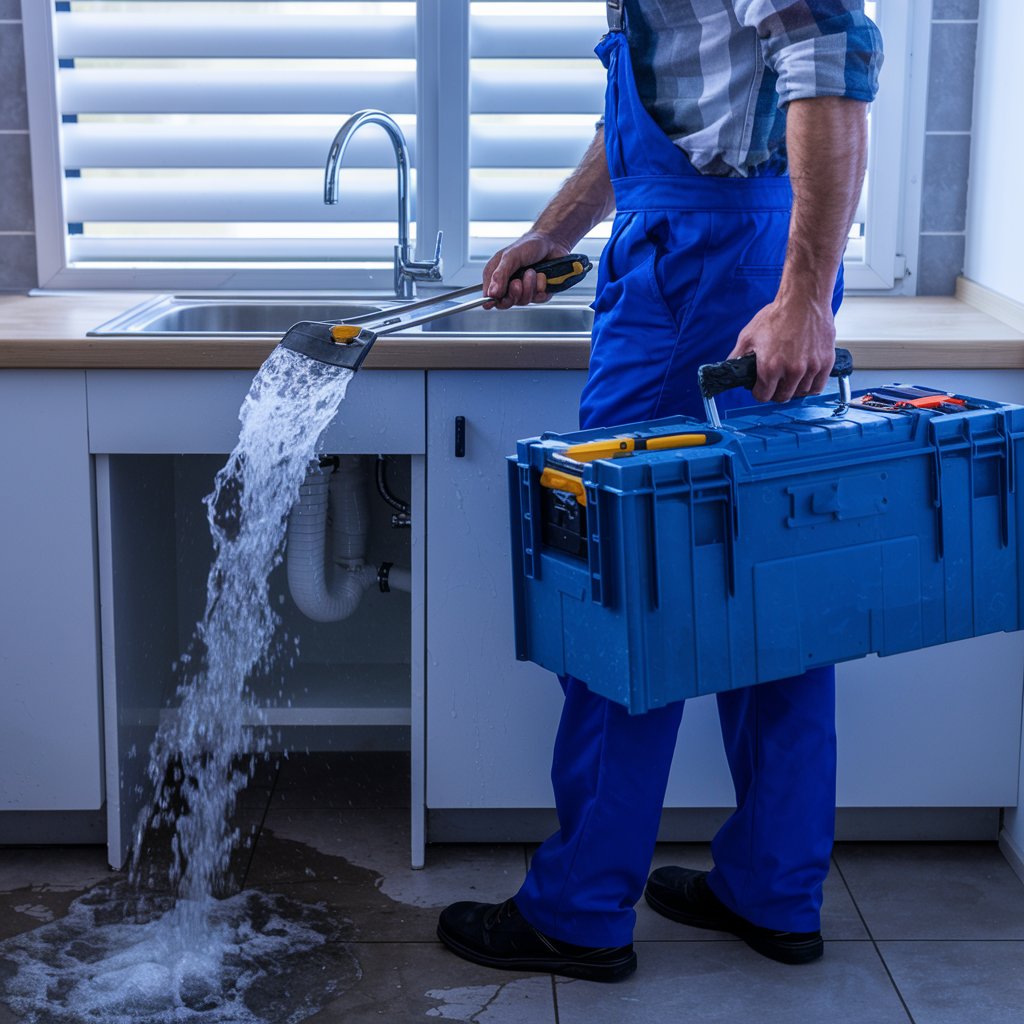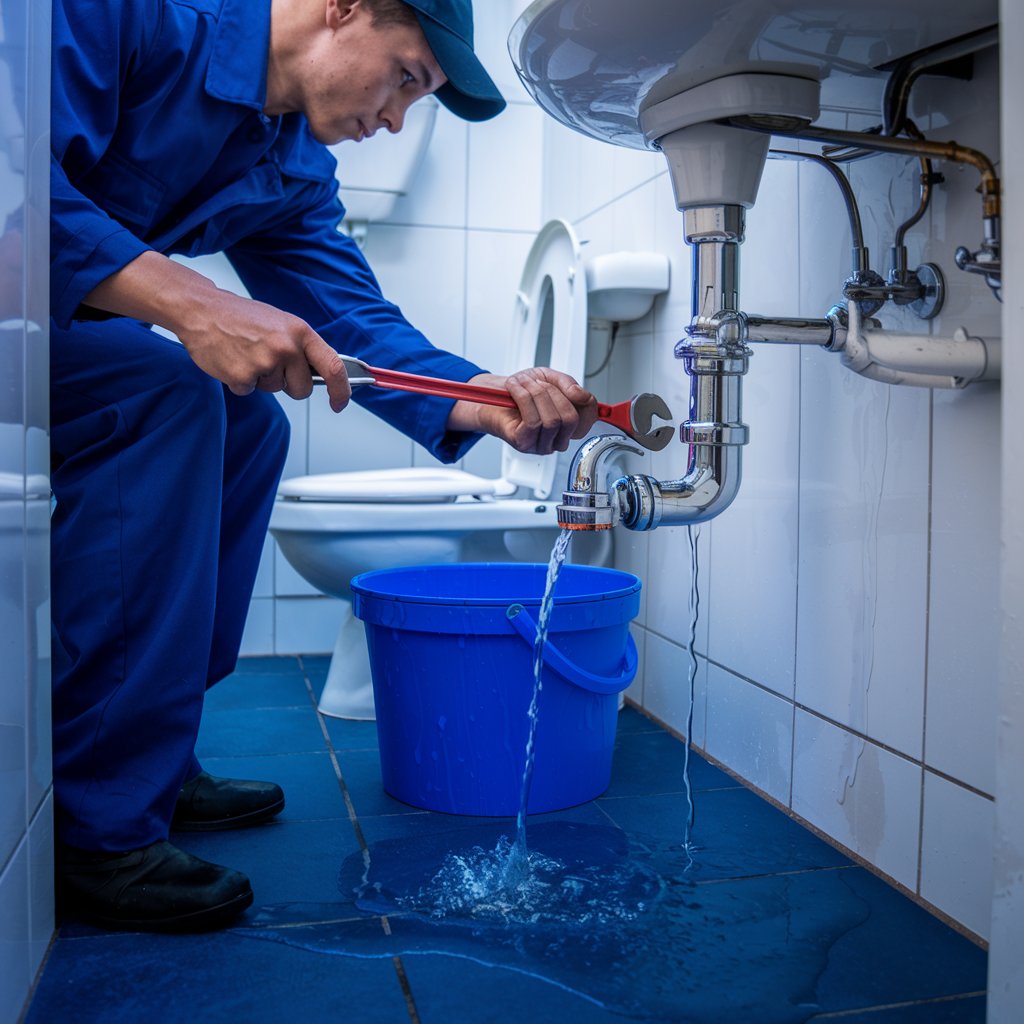
Imagine coming home from work to find a burst pipe flooding your basement – a sudden coincidence that can quickly escalate into a major problem. In times like these, knowing how to handle emergency plumbing situations can be a lifesaver. From knowing when to shut off the water main to understanding the importance of swift action, being prepared can make all the difference. Stay tuned to discover essential tips for dealing with plumbing emergencies and ensuring your home stays safe and dry.
Key Takeaways
- Rapid response from emergency plumbers is crucial for minimizing water damage.
- Main water supply should be shut off for burst pipes to prevent further flooding.
- Persistent clogs and leaks require immediate professional attention to avoid extensive damage.
- Familiarize with main water shut-off valve and keep essential tools for emergencies.
- Contact reliable emergency plumbing services promptly for swift resolution of plumbing issues.
Importance of Emergency Plumbers
When faced with sudden plumbing issues that require immediate attention, the importance of emergency plumbers can’t be overstated. These professionals are equipped to handle urgent situations efficiently, preventing further damage to your property. Emergency plumbers offer a rapid response, arriving promptly to assess and address the issue at hand.
Their expertise allows them to quickly diagnose problems and provide effective solutions, giving you peace of mind during stressful situations.
Furthermore, emergency plumbers have the necessary tools and knowledge to tackle a wide range of plumbing emergencies, from burst pipes to overflowing toilets. Their swift action can mitigate water damage, mold growth, and potential health hazards that may arise from unsanitary conditions.
Common Plumbing Emergencies
During unexpected moments, you may encounter common plumbing emergencies that demand immediate attention. One of the most common issues is a burst pipe, which can lead to significant water damage in your home. When faced with a burst pipe, it’s crucial to shut off the main water supply and contact an emergency plumber right away to prevent further damage.
Another frequent plumbing emergency is a clogged drain. Whether it’s in the kitchen sink, bathroom sink, or shower, a clogged drain can disrupt your daily routine. You can try using a plunger or drain snake to clear the blockage, but if the problem persists, it’s best to seek professional help.
Leaking fixtures, such as faucets or toilets, are also common plumbing emergencies that need to be addressed promptly to avoid wasting water and potential water damage. Tightening connections or replacing worn-out parts can often resolve these issues.
Being prepared for these common plumbing emergencies can help you act quickly and minimize the damage to your home.
Signs You Need Emergency Plumbing
If you notice any of the following signs in your home, it’s essential to recognize that you may need emergency plumbing services.
- Sudden Water Damage: Unexplained water damage on walls, ceilings, or floors can indicate a serious plumbing issue such as a burst pipe or leaking water heater. Addressing this promptly can prevent further damage to your home.
- Persistent Clogs: If your sinks, toilets, or drains are frequently clogging despite attempts to clear them, it could signal a larger blockage in your plumbing system. Ignoring this could lead to sewage backup or flooding.
- No Water Pressure: A sudden drop in water pressure throughout your home may suggest a significant problem like a hidden leak or issues with the main water line. This requires immediate attention to avoid potential structural damage.
Recognizing these signs and acting swiftly by contacting emergency plumbing services can help prevent costly repairs and extensive damage to your property.
How to Prepare for Plumbing Emergencies
To effectively prepare for plumbing emergencies, start by familiarizing yourself with the location of the main water shut-off valve in your home. This valve is crucial in stopping water flow in case of a burst pipe or major leak. Ensure all family members know where it’s and how to turn it off.
Additionally, create an emergency kit with essential tools like a plunger, pipe wrench, duct tape, and plumbing tape. Keep this kit in an easily accessible location.
Regularly inspect your plumbing for any signs of leaks, corrosion, or damage. Addressing these early can prevent major emergencies later on.
Consider installing water leak detectors and automatic shut-off valves for added protection. It’s also wise to have contact information for a reliable emergency plumber handy.
DIY Fixes Before Calling a Plumber
When faced with a clogged toilet or a leaking pipe, you can take immediate action to resolve these common plumbing issues. Simple tasks like using a plunger to unclog a toilet or tightening a loose pipe fitting can often fix the problem. By attempting these DIY fixes before calling a plumber, you may be able to save time and money in emergency situations.
Quick Toilet Unclogging
Facing a clogged toilet can be a frustrating inconvenience that disrupts daily routines. Before calling a plumber, try these quick DIY fixes to unclog your toilet:
- Plunge it: Use a quality plunger to create a seal around the drain and plunge vigorously up and down. This can help dislodge the blockage and get the water flowing again.
- Hot water and dish soap: Pour a mixture of hot water and dish soap into the toilet bowl. Let it sit for a few minutes, and then try flushing. The soap can help lubricate the pipes, and the hot water may break down the clog.
- Baking soda and vinegar: Sprinkle baking soda into the toilet bowl, followed by vinegar. The chemical reaction between the two can create fizzing that might help break up the clog. Let it sit for a while before attempting to flush.
These simple DIY methods can often resolve minor toilet clogs before needing to enlist the help of a professional plumber.
Easy Pipe Leak Repair
Dealing with a pipe leak at home can be a common issue that requires immediate attention. Before calling a plumber, there are a few easy do-it-yourself fixes you can try to stop the leak temporarily.
First, turn off the main water supply to prevent further damage. Then, grab some epoxy putty from your local hardware store. Clean and dry the area around the leak, and apply the putty according to the instructions on the packaging. This should provide a temporary seal until a professional can properly fix the pipe.
Another quick fix involves using a pipe clamp or a rubber sheet and a C-clamp. Wrap the rubber sheet around the leak and secure it in place with the pipe clamp or the C-clamp. This method can also help stop the leak temporarily.

Questions to Ask an Emergency Plumber
During a plumbing emergency, it’s crucial to ask the right questions to ensure you hire a competent professional who can swiftly address the issue. Here are some key questions to ask an emergency plumber:
- Are you licensed and insured?
- Ensure that the plumber is licensed to work in your area and carries adequate insurance. This protects you in case of any accidents or damages during the repair.
- What is your availability?
- Find out if the plumber offers 24/7 emergency services or if there are specific hours they operate. Knowing their availability can help you determine if they can respond promptly to your urgent situation.
- Do you provide upfront pricing?
- Request information on how the plumber charges for emergency services. Clear pricing upfront can help you avoid surprises when it comes time to pay the bill.
Benefits of 24/7 Emergency Services
Providing round-the-clock availability, 24/7 emergency plumbing services offer you immediate assistance whenever unexpected issues arise in your home. This constant availability ensures that you can address plumbing emergencies promptly, regardless of the time of day or night.
By having access to emergency plumbing services around the clock, you can prevent minor issues from escalating into major problems that may cause extensive damage and costly repairs. Additionally, 24/7 emergency services can provide you with peace of mind, knowing that professional help is just a phone call away whenever you need it.
You won’t have to wait until regular business hours to get your plumbing problems fixed, saving you time and minimizing the inconvenience caused by unexpected issues. With 24/7 emergency plumbing services, you can rest assured that skilled professionals will be there to assist you whenever you face a plumbing crisis.
Frequently Asked Questions
What Should I Do if My Water Heater Is Leaking?
If your water heater is leaking, take immediate action. Turn off the water supply to the heater, drain the tank, and inspect for the source of the leak. Contact a professional plumber to assess and repair the issue.
Is It Safe to Use Chemical Drain Cleaners?
Using chemical drain cleaners can be risky. They may damage pipes and harm the environment. Consider safer alternatives like a plunger or plumber’s snake. If you choose to use them, follow instructions carefully.
Can Tree Roots Cause Plumbing Emergencies?
When tree roots invade underground pipes, they can cause severe plumbing emergencies. The roots grow inside the pipes, leading to blockages and leaks. Regular maintenance and professional inspections can prevent this costly and disruptive issue.
How Can I Prevent Frozen Pipes in Winter?
To prevent frozen pipes in winter, insulate exposed pipes, keep cabinet doors open for warm air circulation, and let faucets drip to relieve pressure. Monitor indoor temperatures, seal drafts, and consider using heat tape for added protection.
Should I Turn off the Main Water Supply During Emergencies?
You should always turn off the main water supply during emergencies. It prevents further damage and gives you control. Remember, a quick reaction can save you from costly repairs and keep the situation manageable.
Conclusion
In conclusion, having access to emergency plumbing services is essential for dealing with unexpected plumbing issues quickly and efficiently. Did you know that over 90% of homeowners will experience a plumbing emergency at some point? Being prepared and knowing when to call for help can save you time, money, and stress in the long run. Don’t wait until it’s too late – contact emergency plumbers to address any urgent plumbing problems that may arise.